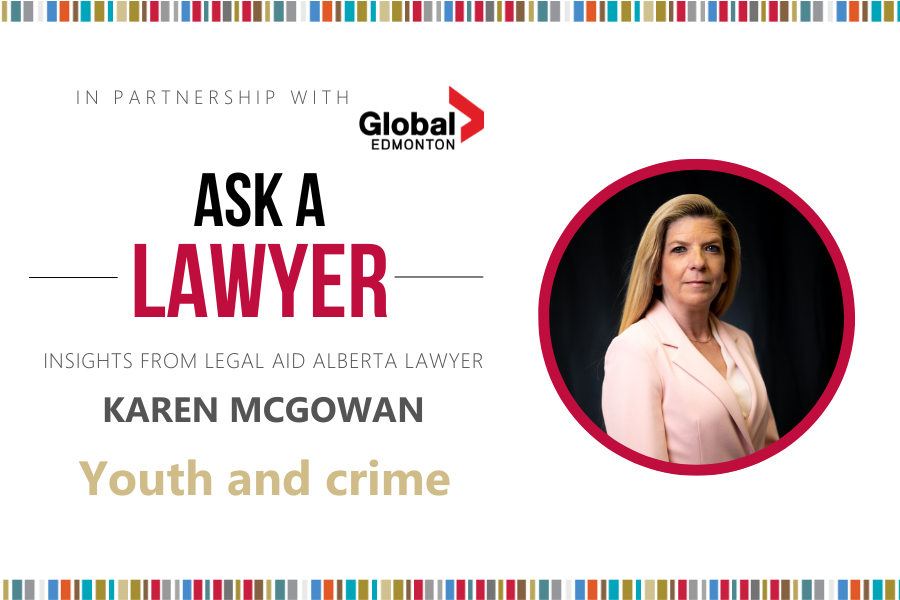LAA lawyer Karen McGowan joined Global News Morning Edmonton to share advice for parents on what to do when your child is at risk of breaking the law.
As a parent, it can be stressful when your child is headed in a problematic direction – even more so when they have been charged with a crime. Who can you turn to for support? What happens when your child is applying for legal aid?
Karen McGowan, youth criminal lawyer with Legal Aid Alberta, joined on Global News Morning Edmonton to talk about the youth criminal justice process, some of the misconceptions of youth criminal law and why it’s important for parents to have conversations with their children about risky behaviour.
Please view the video on Microsoft Edge web browser.
Transcript of the program:
Vinesh Pratap: Welcome back everyone. Well, it can happen to any family, and it’s something parents of teens especially worry about. What can parents do when their kids are committing crimes, or are headed in that direction? Here today to talk about teens and crimes is Legal Aid Alberta Youth Criminal Lawyer, Karen McGowan. Thank you for being here, very important issue. This is probably something a lot of parents don’t think about right until it actually happens and families in general. So how does LAA play when youth are involved are involved in alleged criminal activity?
Karen McGowan: All young people are eligible for legal aid, regardless of what their parental income is, and we have a hybrid model at Legal Aid [Alberta]. We have our in-house staff lawyers, myself who have practiced exclusively in the area of youth work, and then we have a small panel of roster lawyers, who are also trained up in the Youth Criminal Justice Act, and we also have a justice navigator and her role is to connect families with resources, programs, sometimes even as simple as getting a kid’s birth certificate so they can get jobs and stuff like that.
Vinesh: OK so legal aid is available to all youth, but parents may also want to be involved so how does that work? How does that dynamic work?
Karen: Once a lawyer is appointed we exclude the parents from the interviews for two main reasons: one is the solicitor client privilege, as soon as there is a third party in the room, the privilege evaporates. The other is that young people are more forthright with their lawyers if they don’t have to worry about their parents, and consequences they might have from the parents should they say things.
Vinesh: Obviously a broad range of issues are covered when it comes to youth, just like adults. Are there any particular crimes that are more seen in the court system when it comes to representing young people?
Karen: There are two types of charges that I would say crosses all demographics, and that is child pornography and sexual assault. The child pornography is in the sense of young people “sexting” each other, and if they show those images to their buddies or something like that, that could be distributing child pornography. The other is, of course, pushing sexual boundaries. There is zero tolerance nowadays, for this type of behaviour, and kids are young, stupid and immature – and it’s hard enough as an adult to navigate romantic relationships, and it’s even harder for youth who have no experience. Sometimes they do push the boundaries too far and these are the privileged kids and the underprivileged kids, across the board.
Vinesh: Let’s talk about sexting because I don’t think a lot of youth understand the magnitude of what they’re potentially doing here. How serious is it, and is it a slap on the wrist, what happens if it progresses into the system?
Karen: Well for young people, if it’s their first time offence and as long as it’s not a violent offence, typically they are not going to jail but they are given a lengthy period of probation and some treatment, and I think it’s important that you talk to your sons and daughters about it, because once it’s on the internet, it’s there forever, and boys can’t be sharing those images with their friends. If they receive those images, enjoy it for the 30 seconds and delete off of your device.
Vinesh: Finally here, when it comes to youth and crime in general, are their any misconceptions you want to clear up?
Karen: There are a few. Some of those are that young people get off easy – they don’t, young people have to be dealt with very quickly, and most importantly that their criminal records do not magically disappear when they turn 18. Those records remain in effect for about the next three to five years after the completion of their sentence. If you’re seventeen years old, and you get a year probation and now you’re 18, five years later that’s when your record can disappear – so that could have consequences for work or practicum placements in education settings.
Vinesh: Very important advice and never thought about it. OK thank you Karen for coming in today and the advice you’ve given us, very much appreciated.


